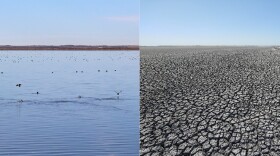You don’t have to travel far to learn something new. During Spring Break, my husband and I jaunted to Courtland, Kansas, to explore Jamestown Marsh and other area sites. I expected to see migratory birds, including eagles, ducks, and geese. I hoped to visit the Pawnee Indian Village Museum to study more about early residents of my region. My to-do list also included antiquing and photography. One thing I never expected to discover was a maple tapping/syrup making operation. In fact, I thought of this as a New England only activity, never considering that Kansans produce local maple products.
Along Highway 36, it was clear the trees realized spring’s official arrival was only days away. Tiny buds turned toward the sun. Robins hopped about still dormant yards looking for a satisfying meal. Once at our destination, we noticed unanticipated seasonal scenery. Scores of maple trees sported not only reddish bud clusters, but blue and silver buckets also adorned their trunks, brightening the landscape.
After cruising each street to confirm our suspicions, we agreed someone was tapping local maples. Upon arriving at Snow Goose Lodge, the mystery deepened. We spied a sugar shack—a small hut containing a wood-burning evaporation unit—with a wood maple leaf cutout labeled, “Republic County Maple Guys.”
Fortunately, our curiosity was soon satisfied. Jim Elliott, lodge host and one of the participants in this colorful spring ritual, was simmering maple syrup as we drove in. He informed us that you could only tap the trees under certain conditions: day temperatures must be above freezing and night temps below. He said the operation typically has a two to three week sap collection window. Our timing was perfect.
Jim and his business partners-- two young men--tap trees, collect sap, reduce it on a wood burning contraption designed for this, and then condense it further on the stovetop to golden brown, thick syrup they bottle to sell at local farm markets. Smelling the kitchen aroma as the well-tended stockpot bubbled told me I want to return as soon as it’s for sale.
Wanting to know more about maple syrup production in Kansas, I researched and found an article online about these entrepreneurs and their efforts. According to the Republic County Economic Development site, this is their third year of production. Each season, with the aid of local maple owners, the team has increased efforts enough to garner approximately 600 gallons of sap this tapping, which should render around 12 gallons of syrup. The article focused on value-added agricultural products.
Even more than goods to sell, I think about the value-added human product Mr. Elliott offers his business partners. The lessons these young men learn about identifying and carefully tapping trees, collecting sap, converting raw material to consumable syrup, and about marketing are a personalized education for everyone involved. Those lads will learn real life math, cooking, food safety, writing, reading, creative thinking, entrepreneurial, and people skills that surpass anything textbooks provide.
Maybe this is what value added is really about. Maybe it’s seeing opportunities to go beyond expanding markets and services. Maybe it’s finding ways to connect rural youth to local resources and using those contact points to create expertise that makes successful business people and employees who stay in Kansas and grow our state.
What began as a restful getaway turned into a bucket full of possibilities. Seeing three Kansans turn a natural resource in their yards into not only an agricultural venture but also a skill and character building effort offers hope that anyone utilizing such assets can create sweet deals as well.







